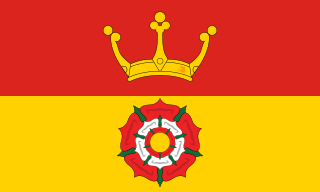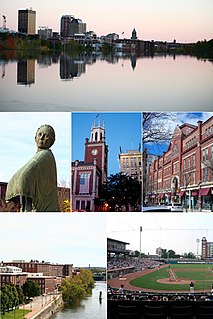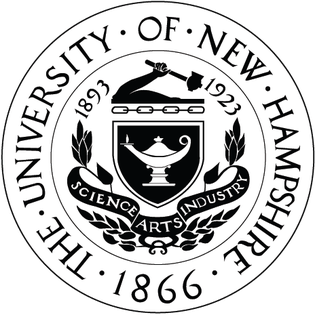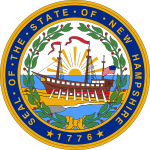
Hampshire is a county in South East England on the coast of the English Channel. The county town is Winchester, but the county is named after Southampton. Its two largest cities are Southampton and Portsmouth which are administered separately as unitary authorities; the rest of the county is governed by a combination of Hampshire County Council and Non-metropolitan district councils.

New Hampshire is a state in the New England region of the United States. It is bordered by Massachusetts to the south, Vermont to the west, Maine and the Gulf of Maine to the east, and the Canadian province of Quebec to the north. Of the 50 U.S. states, New Hampshire is the fifth smallest by area and the tenth least populous, with slightly more than 1.3 million residents. Concord is the state capital, while Manchester is the largest city. New Hampshire's motto, "Live Free or Die", reflects its role in the American Revolutionary War; its nickname, "The Granite State", refers to its extensive granite formations and quarries. It is best known nationwide for holding the first primary in the U.S. presidential election cycle.

Portsmouth is a city in Rockingham County, New Hampshire, United States. As of the 2020 census it had a population of 21,956. A historic seaport and popular summer tourist destination on the Piscataqua River bordering the state of Maine, Portsmouth was formerly the home of the Strategic Air Command's Pease Air Force Base, since converted to Portsmouth International Airport at Pease.

Manchester is a city in Hillsborough County in southern New Hampshire, United States. It is the most populous city in northern New England. As of the 2020 census, the city had a population of 115,644.

Hampshire College is a private liberal arts college in Amherst, Massachusetts. It was opened in 1970 as an experiment in alternative education, in association with four other colleges in the Pioneer Valley: Amherst College, Smith College, Mount Holyoke College, and the University of Massachusetts Amherst. Together they are known as the Five College Consortium. The campus also houses the National Yiddish Book Center and Eric Carle Museum, and hosts the annual Hampshire College Summer Studies in Mathematics.

The governor of New Hampshire is the head of government of New Hampshire.

The General Court of New Hampshire is the bicameral state legislature of the U.S. state of New Hampshire. The lower house is the New Hampshire House of Representatives with 400 members. The upper house is the New Hampshire Senate with 24 members. This ratio of 1 Senate seat for every 16.67 House seats makes New Hampshire's ratio of upper house to lower house seats the largest in the country.

The New Hampshire presidential primary is the first in a series of nationwide party primary elections and the second party contest held in the United States every four years as part of the process of choosing the delegates to the Democratic and Republican national conventions which choose the party nominees for the presidential elections to be held the subsequent November. Although only a few delegates are chosen in the New Hampshire primary, its real importance comes from the massive media coverage it receives. Spurred by the events of the 1968 election, reforms that began with the 1972 election elevated the two states' importance to the overall election, and began to receive as much media attention as all of the other state contests combined. Examples of this extraordinary coverage have been seen on the campuses of Dartmouth College and Saint Anselm College, as the colleges have held multiple national debates and have attracted media outlets like NPR, Fox News, CNN, NBC, and ABC. The publicity and momentum can be enormous from a decisive win by a frontrunner, or better-than-expected result in the New Hampshire primary. The upset or weak showing by a front-runner changes the calculus of national politics in a matter of hours, as happened in 1952 (D), 1968 (D), 1980 (R), and 2008 (D).

The Province of New Hampshire was a colony of England and later a British province in North America. The name was first given in 1629 to the territory between the Merrimack and Piscataqua rivers on the eastern coast of North America, and was named after the county of Hampshire in southern England by Captain John Mason, its first named proprietor. In 1776 the province established an independent state and government, the State of New Hampshire, and joined with twelve other colonies to form the United States.

The University of New Hampshire (UNH) is a public land-grant research university with its main campus in Durham, New Hampshire. It was founded and incorporated in 1866 as a land grant college in Hanover in connection with Dartmouth College, moved to Durham in 1893, and adopted its current name in 1923.
New Hampshire is a state in the New England region of the northeastern United States and was one of the Thirteen Colonies that revolted against British rule in the American Revolution. One of the smallest states in area and population, it was part of New England's textile economy between the Civil War and World War II, and in recent decades is known for its presidential primary, outdoor recreation, and being part of the computer and biotech industry centered around Boston, Massachusetts.

This is a directory of properties and districts listed on the National Register of Historic Places in New Hampshire. There are more than 800 listed sites in New Hampshire. Each of the 10 counties in New Hampshire has at least 30 listings on the National Register.

The New Hampshire Senate has been meeting since 1784. It is the upper house of the New Hampshire General Court, alongside the lower New Hampshire House of Representatives. It consists of 24 members representing Senate districts based on population. As of December 2, 2020, there are 14 Republicans and 10 Democrats.

The New Hampshire Republican State Committee is the affiliate of the United States Republican Party in New Hampshire. Its executive committee is headed by Chairman Stephen Stepanek.

Elections in the U.S. state of New Hampshire are held at national, state and local level. The state holds the first presidential primary in the national cycle. Elections for a range of state positions coincide with biennial elections for the House of Representatives.

Christopher Charles Pappas is an American politician and businessman who has served as the U.S. representative for New Hampshire's 1st congressional district since 2019. From 2013 to 2019, he represented the 4th district on the New Hampshire Executive Council. This includes Manchester along with two additional towns in Hillsborough, six towns in Merrimack, eight towns in Rockingham, and two towns in Strafford County.

The 2016 United States presidential election in New Hampshire was held on Tuesday, November 8, 2016, as part of the 2016 United States presidential election in which all 50 states plus the District of Columbia participated. New Hampshire voters chose electors to represent them in the Electoral College via a popular vote, pitting the Republican Party's nominee, businessman Donald Trump, and running mate Indiana Governor Mike Pence against Democratic Party nominee, former Secretary of State Hillary Clinton, and her running mate Virginia Senator Tim Kaine. New Hampshire has four electoral votes in the Electoral College.

The 2020 United States presidential election in New Hampshire was held on Tuesday, November 3, 2020, as part of the 2020 United States presidential election in which all 50 states and the District of Columbia participated. New Hampshire voters chose electors to represent them in the Electoral College via a popular vote, pitting the Republican Party's nominees, incumbent President Donald Trump and Vice President Mike Pence, against the Democratic Party's nominees, former Vice President Joe Biden and his running mate, Senator Kamala Harris. New Hampshire has four electoral votes in the Electoral College.

The COVID-19 pandemic in New Hampshire is part of an ongoing pandemic of coronavirus disease 2019 (COVID-19) in the U.S. state of New Hampshire. The first confirmed case was reported on March 2, 2020. A state of emergency was declared March 13, which included a ban on gatherings of 50 or more people. A small group filed a lawsuit claiming the order infringed on their right to assemble and worship; a judge dismissed the suit. On March 26, all nonessential businesses were closed and Governor Chris Sununu advised people to only leave home for essential necessities. That stay-at-home order was extended several times before being allowed to expire on June 15. Through November 22, a total of 74 emergency orders had been issued by Sununu. Sununu lifted the mask mandate as of April 16, 2021.

Beginning shortly after the city's incorporation as a city in 1846, elections have been held in the mayor of Manchester, New Hampshire. The following article provides information on the elections for mayor in the city during the 19th century.















